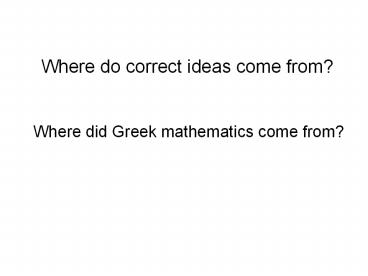Where do correct ideas come from? - PowerPoint PPT Presentation
1 / 11
Title:
Where do correct ideas come from?
Description:
Where do correct ideas come from? Where did Greek mathematics come from? it would seem difficult to argue that before the second half of the fourth century B.C ... – PowerPoint PPT presentation
Number of Views:71
Avg rating:3.0/5.0
Title: Where do correct ideas come from?
1
Where do correct ideas come from?
- Where did Greek mathematics come from?
2
Rhind mathematical papyrus (13th cent. BCE)
it would seem difficult to argue that before the
second half of the fourth century B.C. any aspect
of Greek science - with the possible exception
of axiomatic mathematics - was more advanced than
that of Mesopotamia or Egypt (Bernal 1992)
3
- Greek money (Aegina, drachma, c. 600 BCE)
Greek mathematics(Thales, 6th century BCE)
We reason that this abstraction could result
only through the generalisation intrinsic in the
monetary commensuration of commodity values
promoted by coinage. (Sohn-Rethel,
Intellectual and Manual Labour, p.102.)
4
History - from the National Curriculum1. Pupils
should be taught toa) place events, people and
changes into correct periods of time
- 4. Pupils should be taught
- how to find out about the events, people and
changes studied from an appropriate range of
sources of information - Greek mathematics what are the correct
periods? - What are the appropriate sources?
5
Papyrus with Euclid II.5 from Oxyrhynchus, c. 100
CE.
6
- Greek demotic mathematics ostracon with survey
results. Thebes, Egypt, 30 BCE-14 CE, from
Fowler, plate 8. Some of transliteration appended.
7
YBC 7243 the Babylonian calculation of the
diagonal.
8
- Eratosthenes mesolabe or machine for
doubling cubes - or cubical measure.
9
The figure for Euclid
I.35It may seem a great puzzle to those
inexperienced in this sciencethat the
parallelograms constructed on the same base
should be equal to one another. (Proclus, cited
in Fowler p. 280.)
10
- Hippocrates - quadrature of the lune. The
beginning of Greek mathematics? - (Two very different shapes have the same value.)
11
Hence when all such inventions were already
established, the sciences which do not aim at
giving pleasure or at the necessities of life
were discovered, and first in the places where
men first began to have leisure. This is why the
mathematical arts were founded in Egypt for
there the priestly caste was allowed to be at
leisure. (Aristotle,
Metaphysics I,i.)































